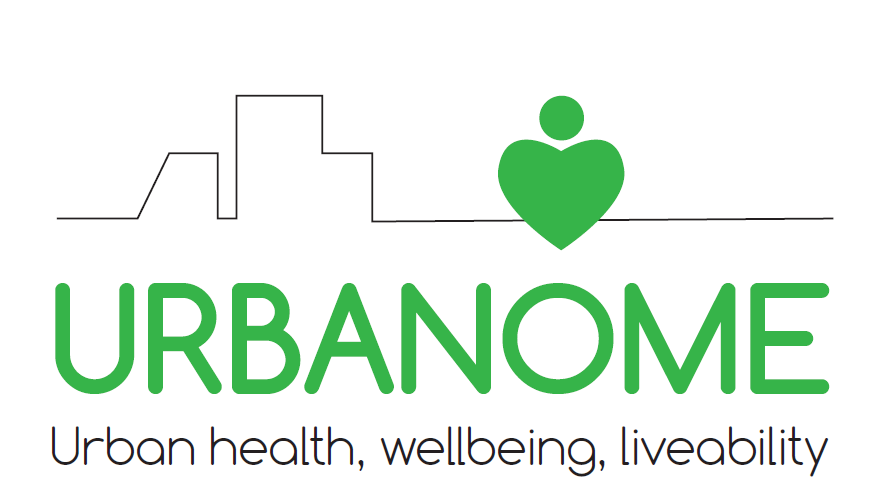Work Packages
WP 1: Methodological framework development
- To review current methodology for personal exposure assessment to health and wellbeing stressors
- To assess the latest advances in external sensor technologies and geo-referenced systems and to define the external exposure at individual level taking into account the socio-economic status (SES)
- To review modelling tools to assess the influence of main determinants on urban health and wellbeing
- To review methods for endogenous exposure approaches for estimating health effects
- To facilitate scientific knowledge and data exchange with and between stakeholders through networking
- To develop the URBANOME methodological approach and to present it to city stakeholders
WP 2: Urban leaving labs for participatory planning and interventions
- To develop sustainable ULLs to engage the quadruple helix and enhance citizens participation in nine European cities to increase their awareness and co-develop sustainable and healthy lifestyles.
- To compile and critically analyse experiences of urban health and wellbeing, within the context of each ULL.
- To facilitate transnational discussion and debate of initiatives to improve urban health and wellbeing, including study and debate of methods, approaches and models.
- To collect data from the living labs, which can feed into subsequent WPs.
- To foster sustainable interventions and design smart solutions to reduce exposure to environmental stressors such as air pollution or noise.
- To develop 3R´s actions (reduce, recycle and reuse) to alleviate the environmental health burden of urban waste
- To perform pilot activities for developing and implementing the URBANOME interventions in the nine ULLs
The objectives will be achieved through:
- Case study compilation (desk and field research)
- Living lab expert workshops
- Production of protocols for the improvement of urban health and wellbeing
WP 3: Development of big data ecosystem
- To fuse information and enable comparison/integration of data by using common ontologies
- To provide a visualization and analytical toolset for the collected big data
- To provide applications helping to improve health and wellbeing and therefore life quality of urban citizens
WP 4: Exposure analysis focusing on patterns of socio-spatial environmental inequality
- To collect data about personal exposure to air pollutants and noise among different population groups including socioeconomic status and environmental inequalities.
- To calibrate and validate the low-cost sensor devices to assess indoor and ambient air exposure.
- To provide ready-to-use models for exposure modelling on the personal and population level that accounts for different socio-economic factors
WP 5: Assessment of physical and mental health and sleep quality
- To assess main non-communicable diseases (NCDs) by using an objective exhaustive evaluation framework
- To identify risk factor of the urban setting related to NCDs
- To estimate the global impact of living in a city on individuals’ health by considering NCDs
- To provide prognostic markers regarding the effect of environmental stressors in NCDs
WP 6: Assessment of personalised interventions and proposed policies
- To perform integrated risk assessment to evaluate the effectiveness of selected personalised interventions
- To perform integrated risk assessment to evaluate the effectiveness of proposed policy options
- To assess cost-efficiency/effectiveness of proposed interventions
WP 7: Innovative and co-creation governance: Targeted policy development and implementation
- To determine the governance architectures – governing structures and cultures – of cities managing environmental problems with health effects and linked social equality
- To improve implementation through novel and cross-sectorial forms of governance
- To develop generic and context sensitive policy approaches and procedures that effectively integrate environment and air quality, physical and mental health and social equality
- To develop a framework for determining the integrated cost-effectiveness of policies targeting health, environmental risks and social equality for specific population groups
- To enhance urban governance capacity through adaptive governance with citizen and stakeholder engagement
WP 8: Evidence-based feedback to the policy makers
- To provide precision prevention strategies
- To derive policy recommendations on how to develop smart and green cities
- To evaluate the efficiency, effectiveness and feasibility of proposed interventions/measures and policy actions
WP 9: Communication, dissemination, training and exploitation
- To organize an efficient transfer of the results of the project to the scientific community, stakeholders and general audience
- To set up focused dissemination and communication strategies aiming the public in the participating ULLs and countries
- To provide a two-way link between users in the scientific and policy communities and the project
- To plan and verify the exploitation potential added value during and beyond the end of the project progress
- To structure a Sustainability plan of the main output of the project towards wider adoption
- To develop a business plan for the project main tangible outcome and business models, including cost-benefit & cost effectiveness analysis, for all project exploitable foreground.
- To prepare the ground for the commercial spin-offs
